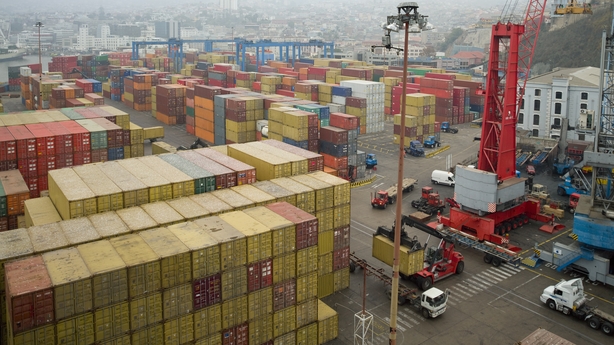US President Donald Trump will sign executive orders today aimed at identifying abuses that are causing massive US trade deficits and clamping down on non-payment of anti-dumping and anti-subsidy duties on imports, his top trade officials said.
The orders come as Mr Trump prepares for his first face-to-face meeting with Chinese President Xi next week in Florida, where trade issues promise to be a major source of tension.
China was the biggest contributor to the $734 billion US goods trade deficit last year, and the meeting "will be a very difficult one" Mr Trump said in a tweet.
The directives allow Mr Trump to focus on meeting his campaign promises to combat the flow of unfairly traded imports into the United States just a week after his pledge to repeal and replace Obamacare imploded in Congress.
Commerce Secretary Wilbur Ross told reporters that one of the orders directs his department and the US Trade Representative to conduct a major review of the causes of US trade deficits.
These include trade abuses such as dumping of goods below costs and unfair subsidies, "non-reciprocal" trade practices by other countries and currencies that are" misaligned."
Mr Ross took pains to say that currency misalignment was not the same as manipulation, and only the US Treasury could define currency manipulation.
But he said in some cases, currencies can become misaligned from their traditional valuations unintentionally, citing the Mexican peso's sharp decline late last year after Mr Trump's election.
The study also will examine World Trade Organization rules that Mr Ross said do not treat countries equally, such as on taxation.
The United States has long complained that WTO rules allow exports to be exempt from value-added taxes, but do not allow export exemptions from the US corporate income tax.
The study also will examine the effects of trade deals that have failed to produce forecast benefits, Mr Ross said.

The aim was to complete the study and report the findings to Mr Trump in 90 days - a time frame that coincides with the expected start of negotiations to revamp the US-Canada-Mexico North American Free Trade Agreement.
The study's findings will underpin the Trump administration's future trade policy decisions, Mr Ross said, and will be the first "systematic analysis" of the trade deficit's causes, "country-by-country, product-by-product."
"It will demonstrate the administration's intention not to hipshoot, not to do anything casual, not to do anything abruptly," Mr Ross told a White House briefing.
Mr Ross has promised tougher enforcement of US trade laws and more anti-dumping and anti-subsidy cases initiated by the Commerce Department, rather than relying on companies to claim injuries from imports.
He said the study would focus on those countries that have chronic goods trade surpluses with the United States.
China tops the list, with a $347 billion surplus last year, followed by Japan, with a $69 billion surplus, Germany at $65 billion, Mexico at $63 billion, Ireland at $36 billion, and Vietnam at $32 billion.
The second trade order to be signed by Mr Trump is aimed at halting the non-payment and under-collection of anti-dumping and anti-subsidy duties the United States slaps on many foreign goods.

